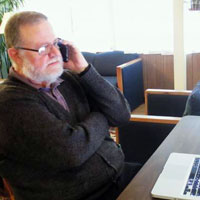September 26, 2016
In the northeast corner of the country, the Presbytery of Cayuga-Syracuse made a dramatic decision. It reduced presbytery staff to just one person and got rid of its office space. Today, Cayuga-Syracuse Presbytery has no building. The office is a laptop, and its number rings to a cell phone in Steve Plank’s pocket. As the lone presbytery employee, Plank has the dual job title of stated clerk/communicator. He works with a volunteer leadership team of 15 elected positions and four ex-officio members.
Cayuga-Syracuse Presbytery’s story is not as unique as one might think. The membership decline in mainline churches often means that a presbytery or synod with a centralized office, staff, and programming is no longer financially sustainable.
Presbyteries and synods are asking: How do we Presbyterians live and function together to express our deepest convictions about being church? They are discovering that some old methods like building in-person relationships are still necessary to strengthen the body of Christ. But new tools like cell phones, video conferencing, and social media are changing the way the work of the church gets done.
“Every mid council is in some form of transition,” said Sue Krummel, director of mid council relations in the Office of the General Assembly. “The business-styled model of presbyteries and synods is becoming a thing of the past.”
The Cayuga-Syracuse mission statement is: Equipping our churches to fulfill the Great Commission. With no program staff or building, this might appear to be an unrealistic goal. However, the lack of building space means that people are connecting in coffee shops and churches rather than in central offices.
“I’ve gone to churches on the outskirts of the presbytery. When I get there, they say that nobody from presbytery has ever been in the building,” Plank said. “Presbytery is not a place; it’s all of us. We at Cayuga-Syracuse are learning to live into this cultural shift in thinking.”
Plank says he is learning to be as mobile and adaptable as the rest of society—a challenge that still faces many churches.
In addition to creating a virtual office, seven months ago Cayuga-Syracuse took another innovative step as it pulled $350,000 of the money it had in reserve and divided it equally among the presbytery’s 38 congregations.
“This action let them know that we believe the churches are the best determiners of fulfilling the Great Commission,” Plank said.
Some churches are still trying to discern what to do with the money. Responses range from purchasing an industrial-quality refrigerator and freezer for the local food pantry to giving the money to smaller, more needy churches in the presbytery to creating programs.
“I make contact and build bridges,” Plank said. He hopes these bridges will strengthen relationships, build networks, and stimulate new ideas for ministry. Plank encourages the people of the presbytery to take responsibility for being the presbytery.
“I’m so honored to work with a group that is willing to throw caution to the wind and try something new,” he said.
George B. Thompson Jr., Missional Transformation Coach, Presbytery of Coastal Carolina
Today’s Focus: Presbytery of Cayuga-Syracuse
Let us join in prayer for:
Presbytery Staff:
Teaching Elder Steve Plank, Stated Clerk/Communicator
Ruling Elder Linda Russell, Chair, Leadership Team
Teaching Elder Shawn Reyburn, Moderator
PC(USA) Agencies’ Staff
Valdir Franca, PMA
Kathy Francis, PMA
Let us pray
God, you call us to proclaim good news in word and deed. Grant us courage to be brave, bold, and imaginative disciples in all we say and do. In Christ’s name we pray. Amen.
Daily Lectionary
Morning Psalms 62; 145
First Reading Hosea 2:2-15
Second Reading Acts 20:17-38
Gospel Reading Luke 5:1-11
Evening Psalms 73; 9
